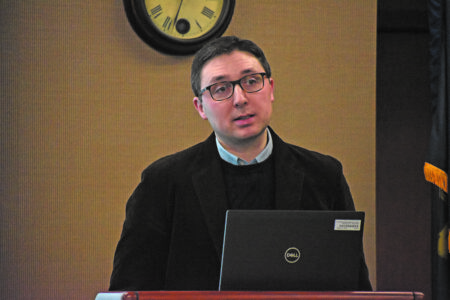Do not be afraid: Fear is part of recovery

[Editor’s note: This is the first of a three-part series that addresses the emotions that those in recovery come to experience once their brains are free of chemicals and begins to heal, and why longterm aftercare is essential to avoiding relapsing.]
Recovery from substance use disorder, whether alcohol or drugs, is a lifelong process, continuing long after the initial treatment ends. That is why 12-step meetings have remained as popular as they have for 80 years.
Throughout the initial treatment phase of recovery, then throughout the aftercare phase, learning to manage the stresses of life without substance use involves learning new ways of behaving in response to negative thinking. This includes learning how not relapse.
Steven Melemis, in his Sept. 2015 scholarly article Relapse Prevention and the Five Rules of Recovery, wrote that there are four main ideas in relapse prevention.
First, relapse is a gradual process with distinct stages. The goal of treatment is to help individuals recognize the early stages, in which the chances of success are greatest.
Second, recovery is a process of personal growth with developmental milestones. Each stage of recovery has its own risks of relapse.
Third, the main tools of relapse prevention are cognitive therapy and mind-body relaxation, which are used to develop healthy coping skills.
Fourth, most relapses can be explained in terms of a few basic rules.
Each stage of recovery has its own risks of relapse, he wrote. The main tools of relapse prevention are cognitive therapy and mind-body relaxation, which are used to develop healthy coping skills.
Melemis explained that there are five rules to avoid relapse in the longterm:
1. Change your life (recovery involves creating a new life where it is easier not to use).
2. Be completely honest.
3. Ask for help.
4. Practice self-care.
5. Don’t bend the rules.
Melemis explained that cognitive therapy is one of the main tools for changing people’s negative thinking and developing healthy coping skills. The most common negative thoughts or attitudes stem from fear.
Fear, wrote Melemis, is a common negative thinking pattern in addiction, which is discussed in the book Alcoholics Anonymous, otherwise referred to as The Big Book.
The Big Book states, in part: “Driven by a hundred forms of fear, self-delusion, self-seeking and self-pity, we step on the toes of our fellows and they retaliate.”
Among those fears common in recovery are:
• The fear that life will not be enjoyable again (particularly prominent during early sobriety)
• Staying sober will require too much effort.
• Fear of journeying into unknown territory.
• Fear of facing life challenges without a chemical crutch.
• Fear of failure or, alternately, success.
• Financial concerns.
As an administrator of the Jaywalker Lodge website wrote in a July 9, 2020, blog post:
“It takes a brave man to admit that he is afraid. Most of us hate to admit that we are ever afraid. Living in addiction and alcoholism, we have likely done plenty of terrifying things.”
The Jaywalker Lodge author goes on to state that:
“So maybe you really aren’t afraid – or maybe you’re just like all the rest of us.”
Jaywalker Lodge is a drug and alcohol treatment center offering a 12-step rehab immersion program for motivated men.
Fear is such a component in recovery, in fact, that it is discussed on many, many recovery-related websites. Life Care Wellness, a Chicago-based therapy clinic, for example, posted an article on its website in 2019 titled 9 Strategies For Overcoming Fear in Addiction Recovery, authored by Jean M. Tschampa.
“Fear is a powerful four-letter word that controls behaviors – more than one wants to admit,” Tschampa wrote. “Fear is a visceral reaction that takes hold, hijacking the conscious mind. When operating under the control of fear, the mind and body are making unconscious, automatic decisions to get out as safely as possible.
“Addiction has a similar hold, except the unconscious mind is doing everything it can to get closer to the substance of choice,” she continued. “The brain is rewired by addiction to search for ways to avoid fear and satisfy the craving. Hence, fear fuels the addiction.”
Fear, as the Jaywalker Lodge pointed out, can also be the source of the anger often associated with SUD, writing:
“What is underneath our destructive alcoholism and addiction? Could our anger and hostility possibly be hiding the fact that we are afraid of something? Could being the ‘lone wolf’ type really be a cover-up for the fact that we’re afraid of getting close to people because we don’t want to get our feelings hurt if they leave us? The answer is usually ‘yes’ – but again, it takes a brave man to admit it,” adding that, “If you’re here and reading this, you’re already braver than you know.”
Resources:
• To read Life Care Wellness’ article 9 Strategies for Overcoming Fear in Addiction Recovery, please visit https://life-care-wellness.com/9-strategies-for-overcoming-fear-in-addiction-recovery/
• Steven Melemis’ article can be read here: https://www.ncbi.nlm.nih.gov/pmc/articles/PMC4553654/
•The Jaywalker Lodge blog post is available at: https://jaywalkerlodge.com/overcoming-fear/






